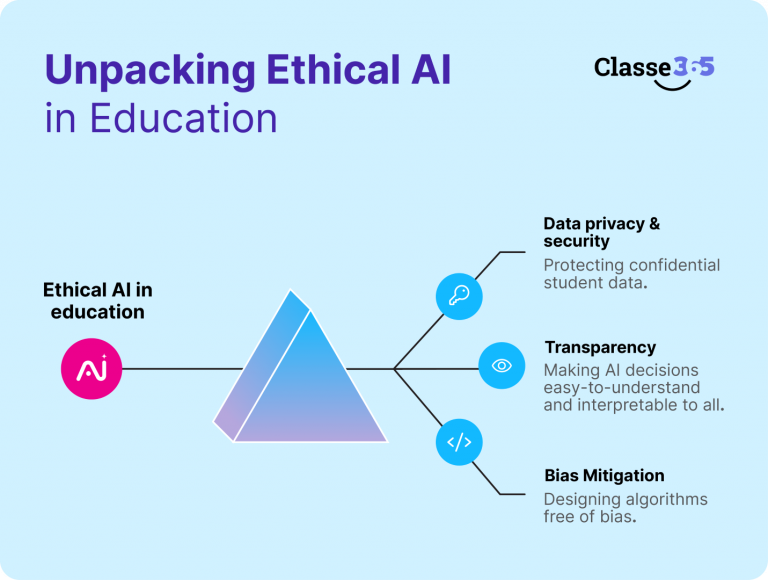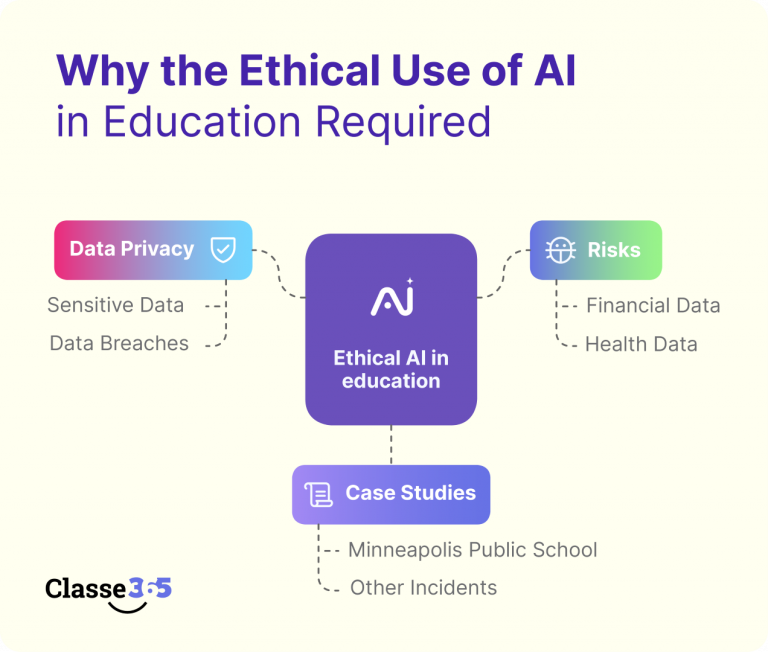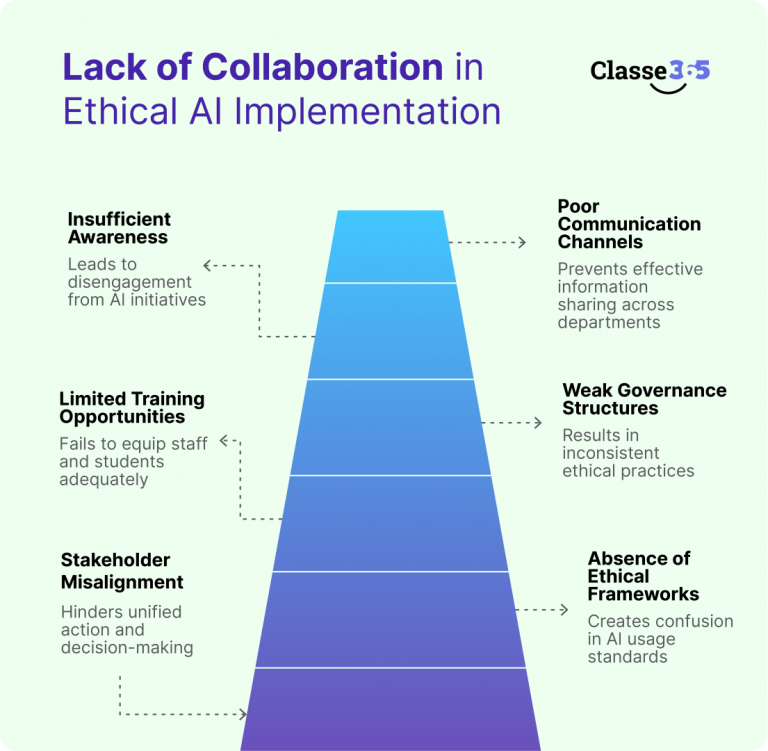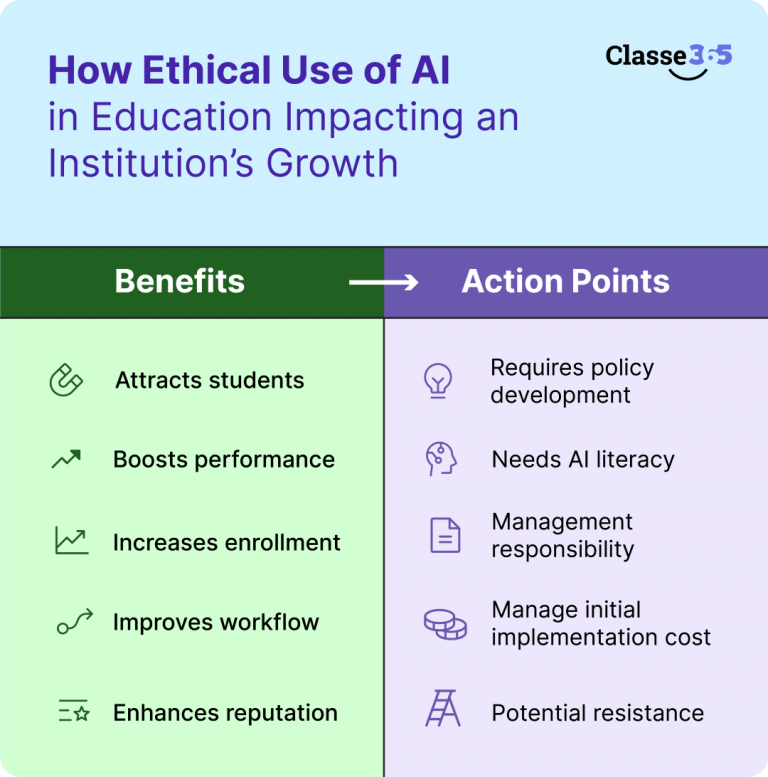The excessive use of AI in education has caused folds in the thought leaders’ foreheads. Uninterrupted access to ChatGPT and other advanced AI tools has broken the thin line between cheating and inspiration.
A Forbes study has revealed that teachers use ChatGPT as much as students. So, where will you create the boundary? Who should be the boundaries for? Also, is this the ideal time for AI literacy?
Many school districts in the US have prohibited the use of AI. Only a few institutions practice AI’s ethical use and drive results from it. You can be one of those pioneer institutions if you embrace the ethical use of AI now.
In this blog, we will unfold how ethical AI can come into practice making you one of the early movers in the education industry. Let us delve deeper.
What is the Ethical Use of AI in Education
Ethical use of AI in education refers to a culture cultivated by a certain institution where AI technologies are deployed responsibly to promote equity, respect privacy, and avoid discrimination.
This further means that a certain institution has set rules around the usage of AI. The students rationally think before applying the data provided by AI. Ethical AI prioritizes inclusivity and ensures that every learner from any background benefits from its application.
Key components of ethical AI in education are:
- Data Privacy & Security: Protecting confidential student data
- Transparency: Making AI decisions easy-to-understand and interpretable to all
- Bias Mitigation: Designing algorithms free of bias

Torrey Trust, an associate professor of learning technology in the College of Education at the University of Massachusetts Amherst, says, “ChatGPT is deeply influenced by the prompt a user gives it.”
For example, if the students insert a data set where female employees get paid less than male employees, AI will suggest a salary standard accordingly. Therefore, trusting AI’s suggestion will create biases and irreparable flaws in the system.
Nowadays, OpenAI and ChatGPT have a strong contender called DeepSeek. The report says it has been the most downloaded app in the USA since its launch. While OpenAI announces that it still is learning and has not been able to overpower human intelligence such as cognitive skills, emotional intelligence, etc, DeepSeek emerges as an artificial general intelligence that claims to compete with human intelligence in all ways, making AI more accessible to people. Experts surmise, that if not applied strict barriers, there won’t be any human-generated content in the next ten years. So, their authenticity will be in question.
Why the Ethical Use of AI in Education Required

In this age of rapid tech evolution, data privacy is at stake. Every website you visit and wherever you go asks for your data through cookies or registration. Some particular data needs to be shared inevitably with everyone. But, data that contains your financial and health assets are not to be compromised at any cost. Only the careful use of AI in education can save you from data breaches.
Among some recent data breaches, the case of Minneapolis Public School is worth mentioning. 100,000 individuals’ data has been breached through the school directory.
Data protection policies and regular data maintenance ensure parents’ and students’ faith in the institution. Therefore, choose a system that treats data as the top priority. Check whether they maintain a GDPR privacy policy. Classe365 has established an Information Security Management System (ISMS), which includes policies that must be followed diligently, consistently, and impartially.
How Ethical Use of AI in Education Impacting an Institution’s Growth
Consider the ethical use of AI in education as a strategic advantage and not only a regulatory requirement. Most US districts have banned the use of AI in education while some are introducing its ethical use.
The significant benefits of prioritizing ethical use of AI in education include:
- Reputation: Pioneering the ethical use of AI in education gives you the extra potential to attract students. The AI tools were launched without any fixed policy or AI education. So, teachers and students have been using the tools without any set rules.
Set your institution apart from the crowd by educating teachers and students about AI’s use. Set policies around it to limit the technology’s abrupt use. - Improved Outcomes: Ethical AI maximizes the benefits of personalized learning platforms like Classe365. It effectively caters to diverse student needs, boosting performance.
Preparing a lesson plan using AI is less difficult than providing AI with the right prompt. Only AI literacy helps teachers come up with the right prompt that produces a bias-free plan. - Increased Enrollment: In this age of AI, every parent wants their children to be responsible citizens with proper AI knowledge. Therefore, parents would be interested in enrolling their children in an institution that provides AI guidance. Additionally, admins with AI literacy will create better enrollment plans by connecting every department and their deliverables. Here is an exclusive guide for increasing enrollment strategy in your institution.
- Smooth Operational Workflow: An AI-literate admin department creates a better workflow for every department in an institution. Classe365 can reduce manual tasks and save time by automating all the jobs. But, managing those jobs flawlessly and creating an inter-department connection is the sole responsibility of the management. AI literacy is important to keep things tied in a string.

AI literacy boosts your institution’s image in every way. It fosters a culture of positivity and transparency by letting parents and students know how AI actually functions and it’s completely driven by humans and not some random vague technology.
How to Implement Ethical Use of AI in Education in Your Institution

Ethical use of AI in education is not practically a one-man job. It requires multiple stakeholders who have a common faith in establishing a practice on a regular workday. A smooth collaboration among educators, policymakers, researchers, developers, and other actors in an institution plays a major role in the AI ecosystem.
For example, an experiment, designed by the researchers, to make students AI-literate, is impossible to implement without the dean’s approval. If the teaching staff are unaware of their role in the experiment, admin staff cannot channel the experiment across the students. Similarly, the marketing department must stay aware of the process and analyze the outcome. Otherwise, the entire process is out of people’s attention, causing no difference to the institution’s growth.
As one of the pioneers to introduce AI literacy in the education sector, you can take these steps:
- Develop Ethical Frameworks and Guidelines
A common vision for the stakeholders ties them into a single knot. Create an ethical framework and a set of principles and values to guide the ethical design, development, use, and impact of AI in education.
For instance, UNESCO has taken the first step and published ‘Recommendation on the Ethics of Artificial Intelligence’, the first-ever global standard of AI ethics. - Implement Ethical Practices and Standards
Besides developing an ethical framework, set ethical practices, and standards. For instance, ethical practices and standards can ensure data quality, maintain algorithmic transparency, and explain data protection policies, human oversight, and intervention. This practice also calls for a periodical evaluation of the outcomes of the stakeholder’s decisions. - Promote Ethical Education and Awareness
The practice of ethical use of AI in education is a continuous process where new people in the institution can easily adapt to the system. Current teachers and students must be so competent that they can train the newbie joining their group. The ethical practice of AI must become a way of life.
For instance, highlight the importance of ethical education through professional development workshops, and parent or donor engagement programs. Create awareness about it by integrating the topic into the curriculum, etc. - Strengthening Ethical Governance and Regulation
Ethical governance and regulation for AI’s usage in education create a responsibility for the stakeholders. They consider it imperative to use AI rationally and ethically to maintain a bias-less environment in the institution.
For example, you can conduct workshops for people from different departments when they share their experiences around AI’s ethical use.
Here comes the importance of education management software. Those who provide you with suggested prompts free of bias implement ethical AI. In the education landscape, leading tools will set the rules first. Only then can education institutions adapt. Therefore, education management tools must be AI-enhanced. The industry’s first AI-enhanced education management platform Classe365 is making educators’ lives easier with AI analytics. You can check attendance patterns and find the at-risk students earlier before they get affected. Through predictive analysis, you can identify students who need extra care and improvements. Have a look here.
The education industry plays a decision-maker’s role in society. Unattended use of AI in this sector will create an imbalance. The fine line between cheating and researching would be abolished. In the end, the impact of artificial intelligence in education would be negative.
But, AI is here to help. We have to decide how we can leverage its power. So, implement ethical use of AI in your institution and make it a USP. You will see the real difference soon in your institution’s working ambiance and a rise in the graph of student enrollment as well.
